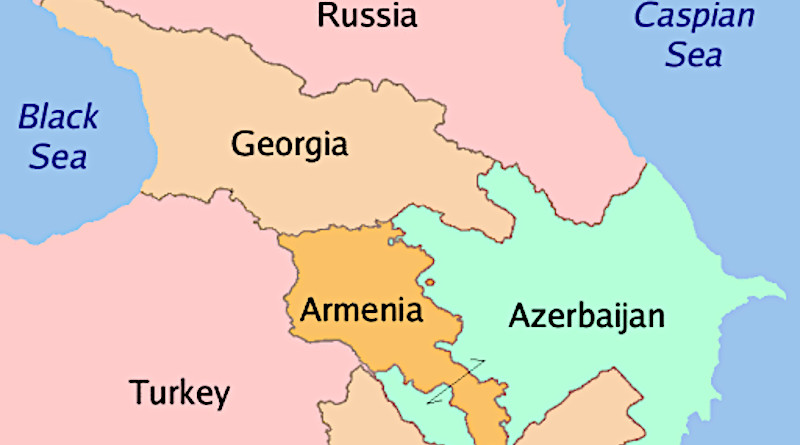Winners And Losers In The Caucasus – OpEd
By Arab News
By Cornelia Meyer*
Central Asia, the Caucasus and the Balkans, the underbelly of the former Soviet Union, are mired in complex ethnic animosities that go back centuries and occasionally flare up into open conflict. We saw it in the former Yugoslavia in the 1990s, and most recently in Nagorno-Karabakh.
This is of great concern to Russia, which considers those regions its backyard and wants to ensure its continued influence. For example, after elections in Belarus that appear to have been won by the opposition, Moscow chose to support President Alexander Lukashenko remaining in office, albeit half-heartedly and perhaps temporarily. Elections will also take place this month in Georgia, which Russia will be closely watching.
Events in Nagorno-Karabakh, meanwhile, represent geopolitics at its highest level. The former Soviet “oblast”, or administrative region, was assigned to Azerbaijan during the break-up of the Soviet Union, despite its majority ethnic Armenian population. A bloody war erupted in 1994, resulting in hundreds of thousands of displaced people, and Armenia took control of parts of the territory. There was a tenuous cease-fire, although various skirmishes erupted between Armenia and Azerbaijan over the next 25 years, and the fighting erupted again in September. Turkey supported Azerbaijan during 44 days of armed conflict that killed more than 5,000 people.
After a series of cease-fires that were broken pretty much immediately after they began, last week Armenia, Azerbaijan and Russia reached an agreement. Armenian forces are to withdraw from occupied districts in the contested region by Dec. 1. A land corridor between the disputed territory and Armenia will be established and secured by Russian peacekeeping forces. There will be a second corridor between the Azeri enclave of Naxcivan on the border with Turkey, allowing travel to Azerbaijan via Armenian territory.
All in all, the agreement was good for Azerbaijan and Russia. The former was able to regain territory which, in their view and according to international law, is rightfully theirs. The latter brokered the deal and asserted its influence. Moscow also will station about 2,000 troops in the area. For Turkey the deal was not all bad either, since its ally Azerbaijan, a fellow Turkic and Muslim country, came out on top. Some Turkish troops will bestationed in the cease-fire monitoring centre, which is on Azeri territory and not Nagorno-Karabakh. This allows Turkey to save face, while Russia clearly calls the shots.
Among the losers are European countries who did not play a role in reaching the agreement, although the Minsk Group of the OSCE had played an instrumental role in reaching past cease-fires.
The biggest losers are Armenia and the Armenian population in Nagorno-Karabakh, who are deprived of what they consider to be their rightful homes. The scenes of ethnic Armenians burning their houses before going back to the homeland have by now become part of the narrative. We should also not forget the fraught history between Armenians and Turkey, and the 1914 genocide, which Turkey denies.
The contrasting scenes in the streets of Baku and Yerevan tell the story better than anything; jubilation in the Azeri capital, while Armenian protesters took to the streets to demand the resignation of Prime Minister Nikol Pashinyan.
Nagorno-Karabakh and the Caucasus may be far away for most of us, but, the region matters. Russia wants to ensure its status amid economic challenges caused by the coronavirus pandemic and a falling oil price, as well as geopolitical challenges posed by the growing influence of China with its Belt and Road Initiative, and European assertions that they should act as mediators.
In the end, Russia was the deal maker and its troops will secure the peace. That is a big geopolitical achievement. However, as NATO troops in Afghanistan and Iraq can tell Moscow, it is a lot simpler to put boots on the ground than it is to withdraw them once they have become involved in the murky geopolitical and sectarian quagmire of the region. The age-old proverb “be careful what you wish for” holds eternally true.
Nothing is easy and everything is complicated in the backyard of the former Soviet Union. For now, we have achieved an uneasy truce, the cost of which is high for the Armenians who have to repatriate — but expect ethnic and religious tensions in the wider region to flare up from time to time. Also expect the regional powers, Russia and Turkey, to try and assert their power while finding a modus operandi.
The US, China, and Europe will watch the goings on with keen interest. The Caucasus and central Asia are, after all, in the neighborhood of the second two, and of geopolitical importance for the first. President-elect Joe Biden has his work cut out.
- Cornelia Meyer is a Ph.D.-level economist with 30 years of experience in investment banking and industry. She is chairperson and CEO of business consultancy Meyer Resources. Twitter: @MeyerResources

